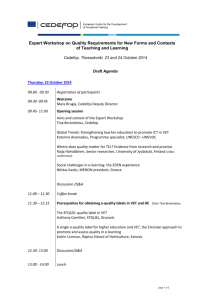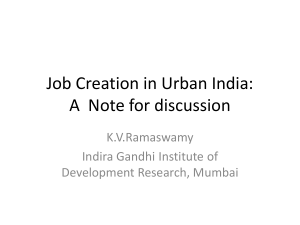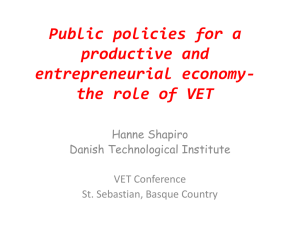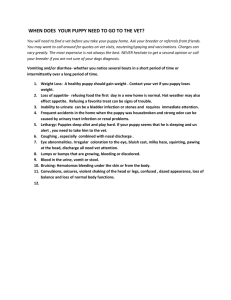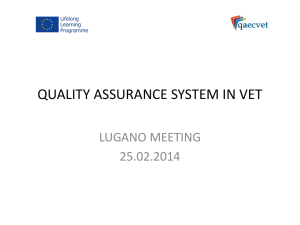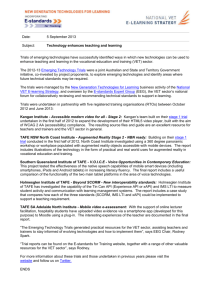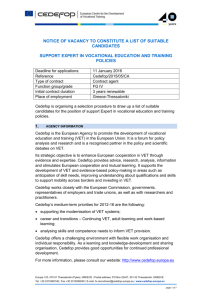Background note
advertisement
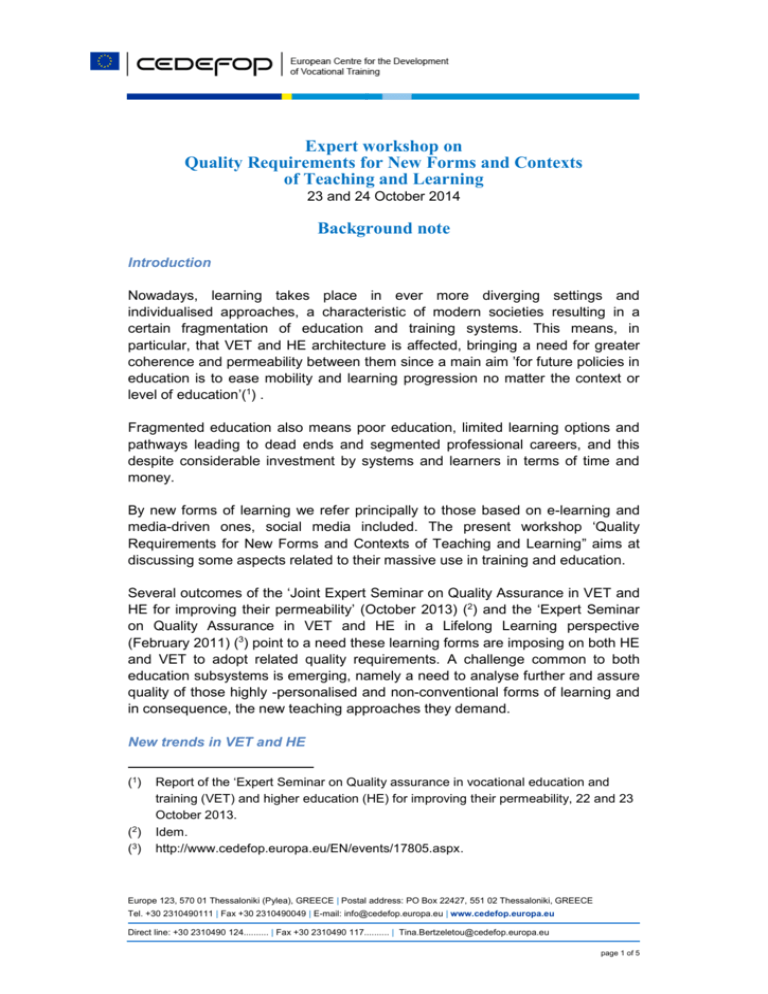
Expert workshop on Quality Requirements for New Forms and Contexts of Teaching and Learning 23 and 24 October 2014 Background note Introduction Nowadays, learning takes place in ever more diverging settings and individualised approaches, a characteristic of modern societies resulting in a certain fragmentation of education and training systems. This means, in particular, that VET and HE architecture is affected, bringing a need for greater coherence and permeability between them since a main aim ’for future policies in education is to ease mobility and learning progression no matter the context or level of education’(1) . Fragmented education also means poor education, limited learning options and pathways leading to dead ends and segmented professional careers, and this despite considerable investment by systems and learners in terms of time and money. By new forms of learning we refer principally to those based on e-learning and media-driven ones, social media included. The present workshop ‘Quality Requirements for New Forms and Contexts of Teaching and Learning” aims at discussing some aspects related to their massive use in training and education. Several outcomes of the ‘Joint Expert Seminar on Quality Assurance in VET and HE for improving their permeability’ (October 2013) (2) and the ‘Expert Seminar on Quality Assurance in VET and HE in a Lifelong Learning perspective (February 2011) (3) point to a need these learning forms are imposing on both HE and VET to adopt related quality requirements. A challenge common to both education subsystems is emerging, namely a need to analyse further and assure quality of those highly -personalised and non-conventional forms of learning and in consequence, the new teaching approaches they demand. New trends in VET and HE (1) (2) (3) Report of the ‘Expert Seminar on Quality assurance in vocational education and training (VET) and higher education (HE) for improving their permeability, 22 and 23 October 2013. Idem. http://www.cedefop.europa.eu/EN/events/17805.aspx. Europe 123, 570 01 Thessaloniki (Pylea), GREECE | Postal address: PO Box 22427, 551 02 Thessaloniki, GREECE Τel. +30 2310490111 | Fax +30 2310490049 | E-mail: info@cedefop.europa.eu | www.cedefop.europa.eu Direct line: +30 2310490 124.......... | Fax +30 2310490 117.......... | Tina.Bertzeletou@cedefop.europa.eu page 1 of 5 The education world is faced with a real shift of paradigm because these new forms of learning are altering major physical and immaterial factors which used to condition education, such as distance, space and time, which no longer play the decisive role they used to. Learning in virtual classes on the Internet, for instance, offers numerous possibilities to learn at one’s own rhythm and place and with teachers from around the world. This multiplication ad infinitum (at least theoretically) of temporal and geographical opportunities for learning affects the whole process of knowledge formation, transmission, acquisition and assessment. It also influences our understanding of who the student/learner is, who the teachers/professors are and how books may look like. It also changes our concept of schools/centres and HE establishments as (unique) places of teaching and learning since telematics universities, for instance, do not need buildings to function as classes are replaced by Internet-based learning environments. For lifelong learning, all these new forms and contexts further blur (already unclear) borders between formal and non-formal learning. HE institutions have been offering, as early as 2000, e-based learning as part of their university curricula. HE courses at a distance are offered simultaneously in several languages to cater for students around the world and they are expected to multiply in the near future. Internationalisation of HE is thus reinforced and competent education authorities (mostly national) take this dimension on board when designing and improving HE policies. Specific frameworks for quality and quality assurance and specific quality labels for these non-conventional educational forms already exist. However, this is not yet the case for VET, where e-learning is less used perhaps because VET professions require knowledge and skills to be acquired (at least partially) through ’learning by doing’ on machinery at the workplace repeating what professionals/trainers are doing. Despite this, e-learning is rapidly growing in the vocational education subsector following evolution of labour markets and professions. Web-based learning has already rendered learning accessible to larger audiences of young people and adults with varying professional and educational backgrounds and needs, who require personalised learning and teaching methods. Traditional curricula have to be redesigned and didactics rethought to allow space for self-learning and time for reflective learning between learners and between learners and instructors who act as coaches in learning Document1 page 2 of 5 partnerships (4).E-learning, despite easy accessibility does not irrevocably provide an inclusive approach to learning, because socially disadvantaged groups have typically less digital experience, which can exclude them. Tackling the digital divide represents a challenge for education and training since ICT preparation of teachers is often adequate for classroom-based teaching but not for non-conventional forms and groups of learners (5). Video lessons, virtual laboratories, virtual classrooms, video forums and conferences are some of the tools used mainly in higher education. Teachers, normally specialised in teaching groups of a certain age and educational level, are now expected to cope with learners of varying ages and learning backgrounds who they may never see in person. This becomes critical for retraining unemployed adults in particular. Teachers and teaching approaches have to guarantee access to technology, provide adequate support systems and customised learning scenarios. They have to be able to deal via Internet with their students and act as coaches, developers and facilitators of self-explanatory material whenever needed. This is a real change of paradigm and explains the considerable impact webbased learning has on the teaching profession which has to keep up with an ever-increasing offer of e-tools by continuously improving their ICT skills to be able to function. New challenges ahead From their side, students demand their expectations be met by educational institutions, including personal growth and being provided with the right tools to meet future challenges (6). Students/learners are also confronted with major changes, the most profound being acquisition of a (greater) command of their own learning, a stronger spirit of initiative and judgement in selecting and combining their learning pathways and using the various learning tools available to them. Shifting from the traditional teacher-centred to student-centred education is required followed by corresponding customisation. As e-based learning is gradually expanding into VET, the same or similar challenges are emerging for VET as well. For instance, VET students have to become more independent, self-organised and mobile than their peers a generation ago. It is clear that a new paradigm is also needed in VET, because relationships between teachers/instructors and students are becoming flatter and more cooperative, both sides being progressively compelled to act as partners in a collaborative and customised learning project. Even greater (than in HE) (4) (5) (6) Donald A. Schon. Educating the reflective practitioner: toward a new design for teaching and learning in the professions. San Francisco, Jossey-Bass, 1987, 355 pages. UCU submission to the commission on adult vocational teaching and learning. ESU (2013).QUEST for quality for students: a student quality concept. Document1 page 3 of 5 numbers of actors involved in VET urgently require insights into the advantages, obstacles and prerequisites in using new forms and contexts of teaching and learning in VET. The technological side of new learning tools is another factor to consider. Their technological properties are constantly reengineered and new and more sophisticated tools are launched on world markets. This influences how information is shaped, transmitted, received and transformed into knowledge. Therefore critical analysis of relevance and quality of e-learning tools is needed. This could take place in parallel with necessary rethinking of educational psychology and pedagogics to cater for e-learning’s independent and interactive character. E-learners are also e-buyers in a vast market with new players coming in such as e-developers, technologists, graphic animation specialists, etc. This intermingled relationship between creation, production, marketing, consumption and learning is a comparatively new phenomenon that transcends national education and training, as well as economic systems of today. Because of e-learning’s borderless nature, an ethical code and quality assurance is called for. Role of quality assurance On quality assurance in particular, there is a need to assess all main actors’ roles and input against a quality framework specially conceived to respond to the above. Such a quality framework should cover input, processes, output and outcomes to measure the value added for greater learning effectiveness. Their assessment against predefined quality standards could prove their indispensable value as components of both teaching and learning, and supporting culture formation. Cedefop is organising the current workshop to promote understanding and transparency in this area. With field experts, the Centre will consider the challenges these new forms and contexts present for teachers and students/learners, and also for quality assurance systems. Cedefop would also like to reflect on whether quality-related requirements of these new forms are common to both HE and VET and, if not, under which conditions they could be shared by both, considering the role and weight of each education subsector. As already mentioned, HE is more advanced in e-teaching and learning and it could fruitfully share its experience with VET. HE also disposes of quality frameworks and labels. Sharing experience gained so far through their application with VET, would greatly contribute to quality assurance and accreditation. This would reinforce cooperation and understanding between them, as required by the communication ’Rethinking education: investing in skills Document1 page 4 of 5 for better socio-economic outcomes’ (7). Such cooperation would also help create a European -area of lifelong learning (8). Joint HE and VET reflection could also be useful for determining whether it is sufficient to revisit and adapt existing quality criteria, principles and guidelines or whether it is necessary to define new ones to respond to the changes in teaching and learning these new forms and contexts have brought with them. During the workshop consideration will also be given to teachers and students and their respective needs for support to take full advantage of these new teaching and learning forms and contexts. Support for teachers and trainers should focus on what they need, including further training measures, to be able to cope with new learning dynamics and develop and deploy courses and learning activities of appropriate quality. Finally, support for students should focus on types of empowerment they need to cope successfully with these non-conventional learning requirements. In this context, customisation and individualisation of learning should be considered. Outcomes of this workshop will enrich Cedefop’s further work on quality assurance in VET and potential synergy between EU VET tools. They will also feed into reflection at the next seminar that Cedefop will organise jointly with the EQAVET secretariat and the Commission in 2015 on quality assurance’s role in bringing HE and VET closer together. *** (7) Communication from the Commission to the European Parliament, Council, European Economic and Social Committee and Committee of the Regions on rethinking education: investing in skills for better socioeconomic outcomes. Strasbourg, 20.11.2012, COM(2012) 669 final htpp://ec.europa.eu/education/news/rethinking/com6609 en.pdf. 8 ( ) Communiqué of the European Ministers for Vocational Education and Training, European social partners and European Commission, meeting in Bruges on 7 December 2010 to review the strategic approach and priorities of the Copenhagen process for 2011-20. http://ec.europa.eu/education/lifelong-learningpolicy/doc/vocational/bruges en.pdf. Document1 page 5 of 5
